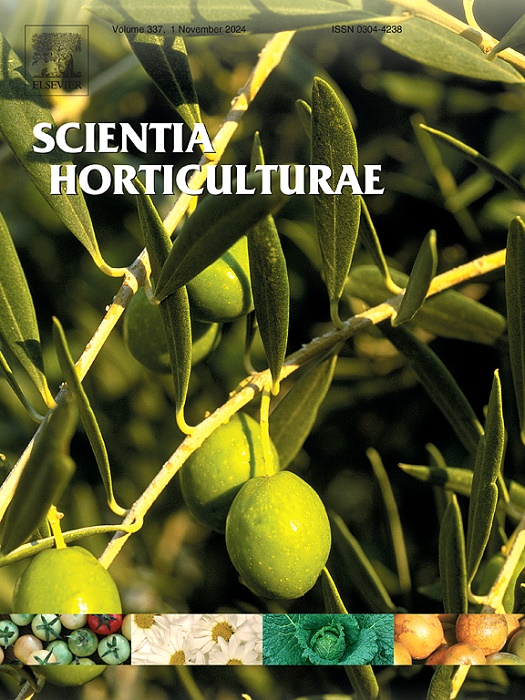Silica nanoparticles promote the growth of pepper under salt stress by improving photosynthesis and modulating the water relationship
IF 3.9
2区 农林科学
Q1 HORTICULTURE
引用次数: 0
Abstract
Salinity stress is a global limitation to agricultural productivity. Silica nanoparticles (SiNPs) have been shown to enhance plant tolerance to salt stress. However, the precise mechanisms by which SiNPs regulate this response in pepper remain poorly understood. This study examined the effects of SiNP300 (300 mg L−1 SiNPs) on salt-stressed pepper plants. The findings revealed that SiNP300 significantly promoted pepper growth and biomass under salt stress conditions. Specifically, treatment with SiNP300 resulted in increases in total chlorophyll content (37.39%), net photosynthetic rate (583.14%), transpiration rate (121.08%), stomatal conductance (249.67 %), Fv/Fm (23.18 %), and ФPSⅡ (43.67 %). In addition, SiNP300 enhanced relative water content, leaf water potential, and root vitality, indicating its role in maintaining water status under salt stress. Moreover, SiNP300 reduced reactive oxygen species (ROS) accumulation, contributing to a reduction in relative electrolyte conductivity (REC), while simultaneously boosting osmotic potential and preserving plasma membrane integrity. Further analysis demonstrated that SiNP300 increased soluble sugar levels in both leaves and roots, likely by modulating the activities of acid invertase (AI), neutral invertase (NI), and sucrose phosphate synthase (SPS), which may improve water status and osmotic regulation under salt stress. Additionally, SiNP300 modulated the expression of aquaporin (AQP) genes (CaPIP1–1 and CaTIP1–1)., thus regulating the water balance of pepper plants in saline conditions. This study provides valuable insights into the mechanisms by which SiNP300 alleviates salt stress and lays the groundwork for developing technologies aimed at enhancing plant resilience to abiotic stress.
纳米二氧化硅通过改善光合作用和调节水分关系促进盐胁迫下辣椒的生长
盐度胁迫是全球农业生产力的限制因素。二氧化硅纳米颗粒(SiNPs)已被证明可以提高植物对盐胁迫的耐受性。然而,在辣椒中,sinp调控这种反应的确切机制仍然知之甚少。本研究考察了SiNP300 (300 mg L−1 SiNPs)对盐胁迫辣椒植株的影响。结果表明,盐胁迫条件下,SiNP300对辣椒生长和生物量有显著促进作用。其中,SiNP300处理显著提高了总叶绿素含量(37.39%)、净光合速率(583.14%)、蒸腾速率(121.08%)、气孔导度(249.67%)、Fv/Fm(23.18%)和ФPSⅡ(43.67%)。此外,SiNP300提高了相对含水量、叶片水势和根系活力,表明其在盐胁迫下维持水分状态的作用。此外,SiNP300减少活性氧(ROS)的积累,有助于降低相对电解质电导率(REC),同时提高渗透电位并保持质膜完整性。进一步分析表明,SiNP300可能通过调节酸性转化酶(AI)、中性转化酶(NI)和蔗糖磷酸合酶(SPS)的活性,提高了叶片和根的可溶性糖水平,从而改善了盐胁迫下的水分状况和渗透调节。此外,SiNP300调节水通道蛋白(AQP)基因(CaPIP1-1和CaTIP1-1)的表达。,从而调节盐碱条件下辣椒植株的水分平衡。该研究为揭示SiNP300减轻盐胁迫的机制提供了有价值的见解,并为开发旨在提高植物抗非生物胁迫能力的技术奠定了基础。
本文章由计算机程序翻译,如有差异,请以英文原文为准。
求助全文
约1分钟内获得全文
求助全文
来源期刊

Scientia Horticulturae
农林科学-园艺
CiteScore
8.60
自引率
4.70%
发文量
796
审稿时长
47 days
期刊介绍:
Scientia Horticulturae is an international journal publishing research related to horticultural crops. Articles in the journal deal with open or protected production of vegetables, fruits, edible fungi and ornamentals under temperate, subtropical and tropical conditions. Papers in related areas (biochemistry, micropropagation, soil science, plant breeding, plant physiology, phytopathology, etc.) are considered, if they contain information of direct significance to horticulture. Papers on the technical aspects of horticulture (engineering, crop processing, storage, transport etc.) are accepted for publication only if they relate directly to the living product. In the case of plantation crops, those yielding a product that may be used fresh (e.g. tropical vegetables, citrus, bananas, and other fruits) will be considered, while those papers describing the processing of the product (e.g. rubber, tobacco, and quinine) will not. The scope of the journal includes all horticultural crops but does not include speciality crops such as, medicinal crops or forestry crops, such as bamboo. Basic molecular studies without any direct application in horticulture will not be considered for this journal.
 求助内容:
求助内容: 应助结果提醒方式:
应助结果提醒方式:


